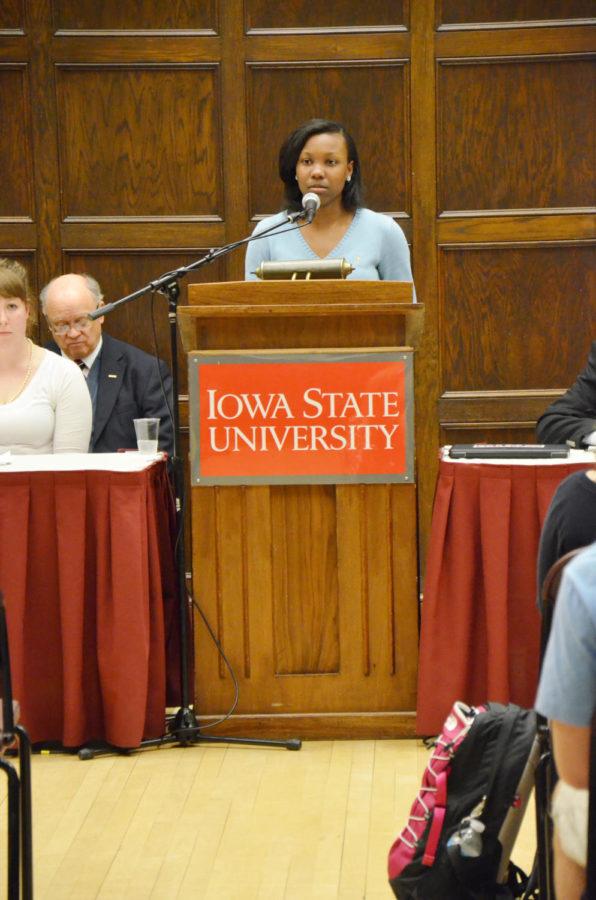Democrats win Caucus Cup debate
April 8, 2013
The ISU College Democrats beat the College Republicans Monday night in the annual Caucus Cup debate, part of the First Amendment Day series put on by the Greenlee School of Journalism and Communication.
The debate, which took place in the Memorial Union, consisted of the Republican and Democrat teams, each having four members.
The Republicans were represented by Nigel Hanson, Stephen Mayne, Locky Catron and David Pedersen; the Democrats were represented by Tim Nelson, Conner Barnhart, Zoe Kustritz and Britteny Ross.
Moderator for the debate was Thomas Beell of the Greenlee School.
The basis of the debate dealt with the low trust and satisfaction with the federal government by the American people. Questions pertaining to government expenditures, the education system, filibustering, campaign finance law, mental health and gun control were directed toward the two organizations.
“The United States has been the most divided in the past four years since the Civil War,” said Nigel Hanson, freshman in political science, during his opening statement for the Republicans.
The College Democrats, in their opening statement, emphasized that the Republicans had put their ideological concerns over the true issues at hand, and that the Democratic policy would renew faith in the federal government.
Labor unions and increasing government expenditures were topics debated at length in which Democrats placed the blame for the high deficit on the Republicans.
“Labor unions are not the problem for the deficit. The cause was the 2008 meltdown,” said Tim Nelson, freshman in political science. “The Republicans were trying to sway the blame for the meltdown [towards] the unions to protect themselves or to protect the corporations.”
Republicans like David Pedersen, sophomore in accounting and finance, highlighted that Democrats had control of both the House and the Senate during the meltdown, so he concluded they were part of the problem.
He also pointed out unions are practical, but the contracts with the federal government need to be renegotiated and local governments need to be given more control on the matter of union contracts.
Both parties agreed briefly during the debate on the voucher system in education and how it could help better the U.S. educational system.
Democrat Britteny Ross, freshman in chemistry, stated they should be used, but not fully embraced, because they are run by for-profit companies, unlike public schools.
“We can send children to voucher schools, but what happens to the ones who can’t afford it?” said Ross. “We need to reinvest in our public schools to truly fix the problem.”
During the gun control debate, Republican Stephen Mayne, senior in agricultural studies, pointed out that guns are a minimal cause of murders in the U.S., while hammers and knives cause many more deaths, but are not regulated.
“There are many other ways people are being killed which cause more deaths than guns,” Mayne said. “So why don’t we control those things?”
Democrats emphasized the need for universal background checks to regulate the purchase of firearms.
“These measures will create a safer America. Is it such a burden to go through a background check?” said Zoe Kustritz, a Democrat and freshman in design.
During the closing comments, Mayne asked the people in attendance to get involved and stay informed in politics.
“We’re currently in a crisis which will take many years, if not decades, to fix,” Mayne said. “We need to ask ourselves, ‘Who are we as a country?’ We need to reach across the aisle and work with one another.”







